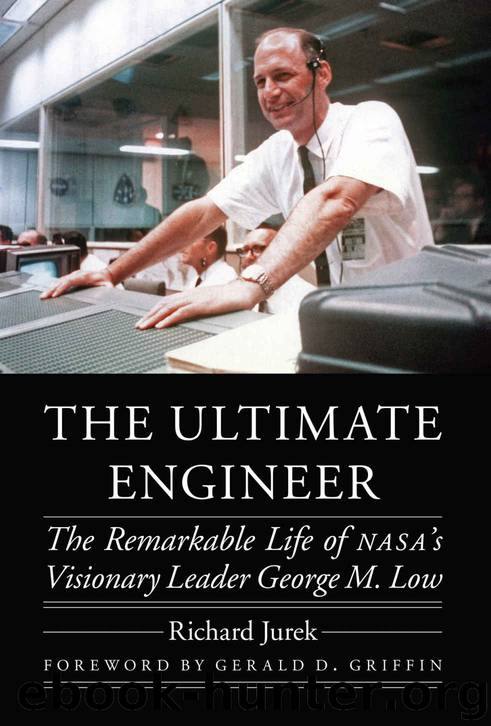The Ultimate Engineer: The Remarkable Life of NASA's Visionary Leader George M. Low (Outward Odyssey: A People's History of Spaceflight) by Richard Jurek

Author:Richard Jurek [Jurek, Richard]
Language: eng
Format: azw3
Tags: HIS036060 History / United States / 20th Century, BIO015000 Biography & Autobiography / Science & Technology, BIO006000 Biography & Autobiography / Historical
ISBN: 9780803299559
Publisher: UNP - Nebraska
Published: 2019-11-30T16:00:00+00:00
Low considered Apollo 8 the emotional highlight of the program.163 For many years afterward, he would often gift the Bill Anders Earthrise photo taken from lunar orbit as a memento to friends, colleagues, and well-wishers. It was one of his favorite images. It perfectly captured the emotional payoff of one of the boldest risk-reward decisions of his entire career. Ten years later he gave a speech on productivity and innovation in America. U.S. productivity was faltering in 1979, and Low pointed out that productivity gains in the country were half of what they were between 1954 and 1966. A big reason for this decline, Low said, was a lack of innovation, which had been choked out by excess regulation driven by risk aversion. In the speech, Low went back to his experience on Apollo 8 to make his point. In so doing, he put Apollo 8 into a broader, national perspective.
In his mind, making these risk-reward decisions is the key to future human success on the planet. At a joint meeting of the Capital District Chambers of Commerce, held in Troy, New York, on 19 April 1979, Low said,
New rules and regulations . . . are generally designed to protect us against the risks of life, which fail to recognize that without risk, there can be no gains.
Let me digress and tell you an anecdote about Apollo. The time was ten years ago, and NASA was making preparations for one of its most daring ideas: Apollo 8, a flight to lunar orbit, a flight which had been conceived a scant three months earlier. . . . Just picture for a moment the situation which the engineers, program managers, and administrators of NASA then faced. Less than two years earlier, a tragic fire on the launchpad had taken three lives, and we were still recovering from the shock of that event. The Apollo spacecraft had been redesigned and rebuilt. It had just completed its first flight in Earth orbit. The Saturn V, which was needed for Apollo 8, had flown twice before, unmanned, but on its second flight, three of its hydrogen-fueled engines had failed. Nevertheless, we decided that in another month or so we should leave the confines and the relative safety of Earth orbit and send three men to the moon.
Why?
Because we believed the gains were worth the risks. I’ll never forget how later on, in mission control, we were all acutely aware of those risks when the Apollo spacecraft with three men in it for the first time disappeared behind the moon—something that had never happened before. . . . This balance of risk and gain applies not only to Apollo. It applies to energy, to the environment, to the economy—in fact, it applies to our future as a nation, and perhaps even to our future as a human species . . .
I hope my message is clear. Much needs to be done to rekindle the American spirit of innovation, and that spirit is needed to help keep America great.
Download
This site does not store any files on its server. We only index and link to content provided by other sites. Please contact the content providers to delete copyright contents if any and email us, we'll remove relevant links or contents immediately.
| Africa | Asia |
| Canadian | Europe |
| Holocaust | Latin America |
| Middle East | United States |
Fanny Burney by Claire Harman(26603)
Empire of the Sikhs by Patwant Singh(23086)
Out of India by Michael Foss(16853)
Leonardo da Vinci by Walter Isaacson(13336)
Small Great Things by Jodi Picoult(7143)
The Six Wives Of Henry VIII (WOMEN IN HISTORY) by Fraser Antonia(5515)
The Wind in My Hair by Masih Alinejad(5095)
A Higher Loyalty: Truth, Lies, and Leadership by James Comey(4964)
The Crown by Robert Lacey(4817)
The Lonely City by Olivia Laing(4802)
Millionaire: The Philanderer, Gambler, and Duelist Who Invented Modern Finance by Janet Gleeson(4478)
The Iron Duke by The Iron Duke(4356)
Papillon (English) by Henri Charrière(4274)
Sticky Fingers by Joe Hagan(4199)
Joan of Arc by Mary Gordon(4113)
Alive: The Story of the Andes Survivors by Piers Paul Read(4033)
Stalin by Stephen Kotkin(3968)
Aleister Crowley: The Biography by Tobias Churton(3640)
Ants Among Elephants by Sujatha Gidla(3467)
